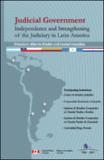| dc.description.abstract |
Judicial government is an essential issue for consolidating Latin American
democracies. Conceptually defining and empirically exploring it and
how the Judiciary works in different nations is a fundamental task for guaranteeing both the legitimacy of judges in the performance of their duties and, more importantly, the fair impartation of citizens’ rights. The discussion of judicial government should include a political aspect, which addresses the independence of the Judiciary from other public entities and interest groups and should also consider the operational aspect of
the organization and actions of judges from the perspective of the strengthening of their functional autonomy, and the transparency and objectivity of the rules regarding the selection, appointment and promotion of judges in the judicial career. |

